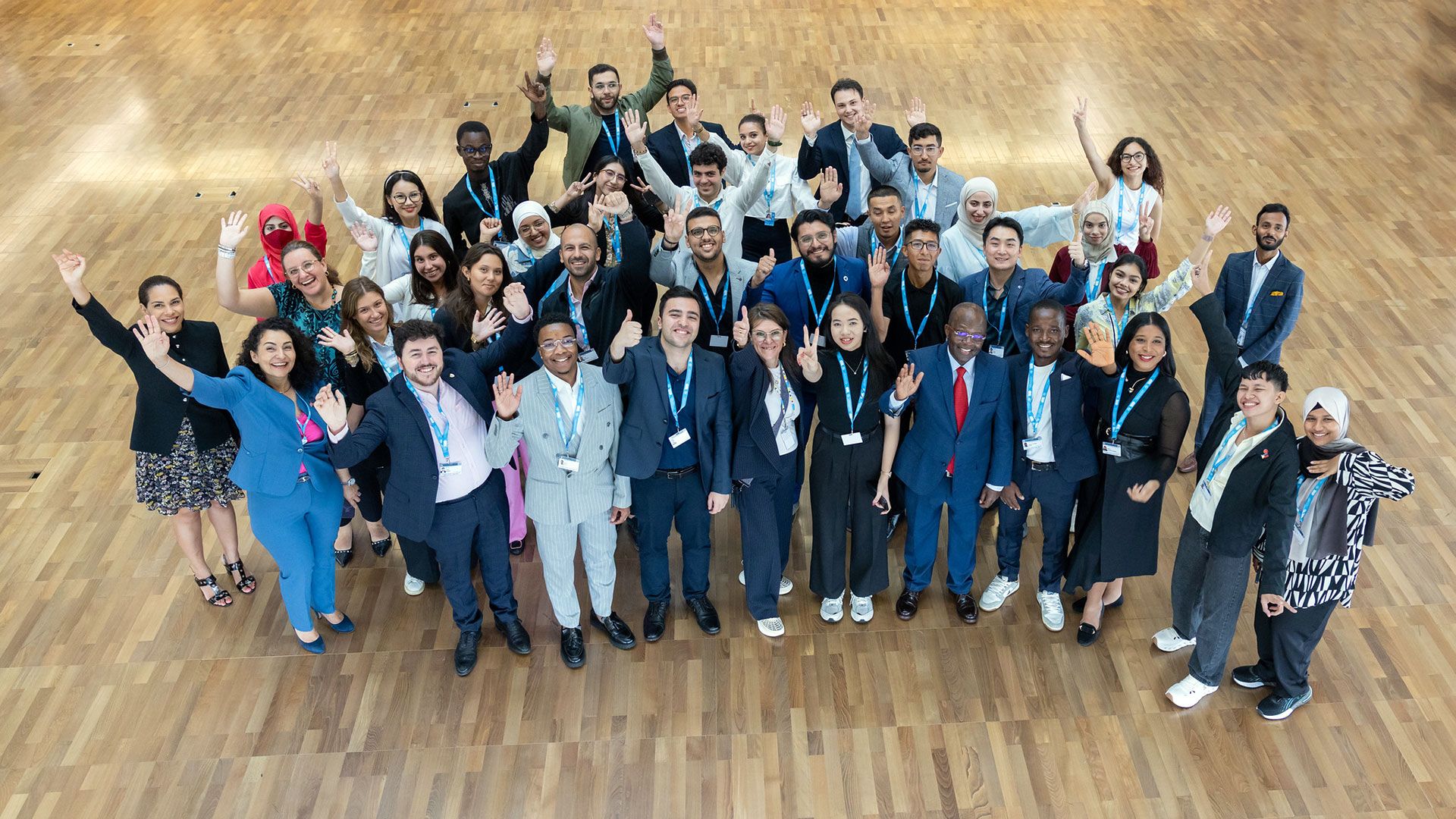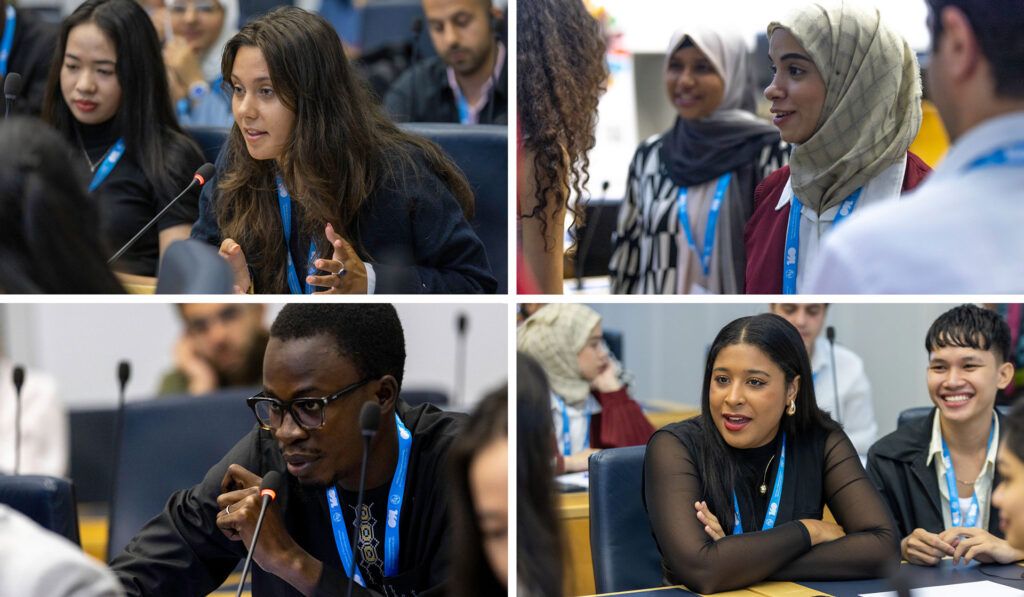
Generation Connect Youth Leadership Programme showcases digital solutions
Thirty-one young people from around the world travelled to Geneva, Switzerland, in July to pitch their community-enhancing digital initiatives to the global diplomatic community.
They also took part in a week of intensive training and have now embarked on a year of project development under expert guidance from the International Telecommunication Union (ITU).
The Generation Connect Young Leadership Programme (GCYLP) provides participants ages 18 to 28 with USD 5,000 each in seed funding and year-long access to mentorship from ITU as they refine digital projects to help their own countries and communities thrive. At the end of the year, six standout projects from regions spanning the globe will receive another USD 5,000 grant for scale-up.
ITU hosts the GCYLP in partnership with Huawei, aiming to inspire, engage, and empower the next generation of digital leaders. The second cohort features young men and women from 25 countries.
“This programme, enabled by the generous support and collaboration of Huawei, continues to show what is possible when young people are given the tools and encouragement to lead,” said Cosmas Luckyson Zavazava, Director of the Telecommunication Development Bureau at ITU. “The projects they have developed are as diverse as the communities they represent.”
The result is a showcase of fresh ideas, frequently taking advantage of artificial intelligence (AI), mobile apps and smart devices.
“Some focus on making the Internet safer, others on saving energy or expanding access to digital tools,” said Zavazava. “But what is most inspiring is how rooted they are in everyday life.”
A rare opportunity
The training week in Geneva, first held last year, launches young digital leaders into the world with essential information and skills to create high-impact, sustainable projects. Topics include leadership, project management, digital inclusion, entrepreneurship, and sponsorship strategies.
It was the first time many participants had ever presented their ideas in a high-level forum. For some, this was also their first trip outside their home countries.
Ambassadors from around the world had front-row seats at ITU headquarters to hear about innovations ranging from life-saving health IDs for people in remote rural communities to digital literacy training for girls.
All the pitches described innovations to build a more inclusive and connected digital future.
For example:
- LinguAI is using AI to help people in Zimbabwe and Ghana who speak local languages or use sign language to get better access to digital tools.
- Vigilant Bolivis, a mobile app in Bolivia, helps people spot scams by checking messages, e-mails, or voice recordings.
- A smart energy platform developed in Jordan uses AI and Internet of Things devices – gadgets that talk to each other online – to save electricity and strengthen the power grid.
- Women in Tech Security, a community project in Indonesia, helps women and underrepresented groups learn about online safety and explore careers in cybersecurity.
- A mobile disaster alert app developed in Azerbaijan uses AI and smart sensors to scan satellite images and real-time data, helping detect disasters quickly and send alerts.
- A smart AI-powered system helps charities in the UK manage data, reduce paperwork, and improve how they support people.
The week’s activities also included visits to the Palais des Nations, main office of the United Nations in Geneva, and the International Trade Centre, a joint agency of the United Nations and the World Trade Organization (WTO) that supports the development of micro, small, and medium-sized enterprises.
Updates from last year’s fellows
GCYLP Development Week 2025 also featured updates by two Young Leadership fellows from 2024, who returned to Geneva to talk about how their projects have developed and what they have learned.
Digital access and education in Pakistan
Muhammad Zubair Madni of Pakistan updated the group on DIGITAL ROHI, which is improving digital access, education, and inclusion for thousands of people in indigenous nomadic communities in Cholistan, a remote desert region with limited Internet connectivity.
“What truly distinguished the GCYLP for me was its holistic approach,” Madni said. “It offered mentorship, leadership development, access to global networks, and seed funding, all essential components for turning an early-stage concept into a tangible, scalable initiative.”
He explained how the programme had helped launch DIGITAL ROHI: “More than just financial support, GCYLP offered visibility, credibility, and international exposure. DIGITAL ROHI was showcased on several global platforms, which broadened its reach and opened doors to new partnerships and engagement.”
Madni emphasized the importance of local insight paired with global cooperation: “The most significant takeaway for me was the realization that meaningful change begins with local insight but requires global cooperation to scale. The GCYLP helped me understand how to transform a community-rooted challenge into a globally relevant initiative by connecting me with mentors, peers, and industry leaders who shared their expertise and encouragement.”
Clean, affordable energy in Nigeria
James Thomas Terhemba of Nigeria shared insights from his project TED Evergreen, which tackles energy poverty in underserved rural communities by leveraging digital technology to expand access to clean energy.
In areas where unreliable electricity hampers digital inclusion, TED Evergreen provides affordable solar-powered systems embedded with smart technology that analyses customer data to offer personalized, flexible payment options based on energy consumption. This approach helps break affordability barriers for low-income households and small businesses, while also advancing digital inclusion in rural Nigeria.
“The GCYLP trained me to think ahead and design for a larger, more diverse user base than I initially anticipated,” Terhemba said. “That mindset helped to improve the digital payment system, making it more seamless and efficient. As a result, the project has been receiving better feedback from our customers, and we’re now in a stronger position to support more households and small businesses with clean energy access.”
Terhemba said he applied to the fellowship because it “offered practical support for innovative projects like mine, providing training, mentorship, and funding that helped refine our approach and accelerated our work. The programme gave my project greater support, visibility and credibility, which helped attract more interest from partners and potential funders. As a result, we’ve been able to expand our reach to more users, improve our product offering and its innovative features, and build stronger community engagement strategies.”

Watch the GCYLP Development Week 2025 highlights video.
Learn more about Generation Connect
Engaging youth to shape the digital future will be a key priority at ITU’s World Telecommunication Development Conference (WTDC-25), coming up in Baku, Azerbaijan, between 17 and 28 November.
Header image credit: ITU/ J. MacLeod (participants of the Generation Connect Young Leadership Programme (GCYLP) week at ITU headquarters in Geneva, Switzerland)
